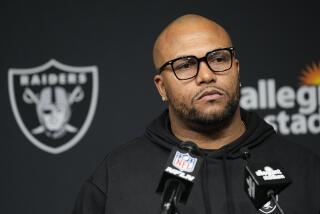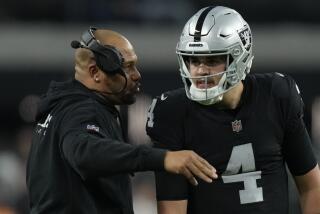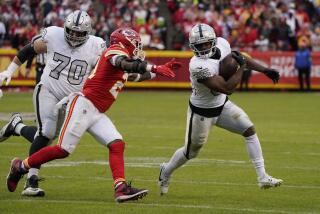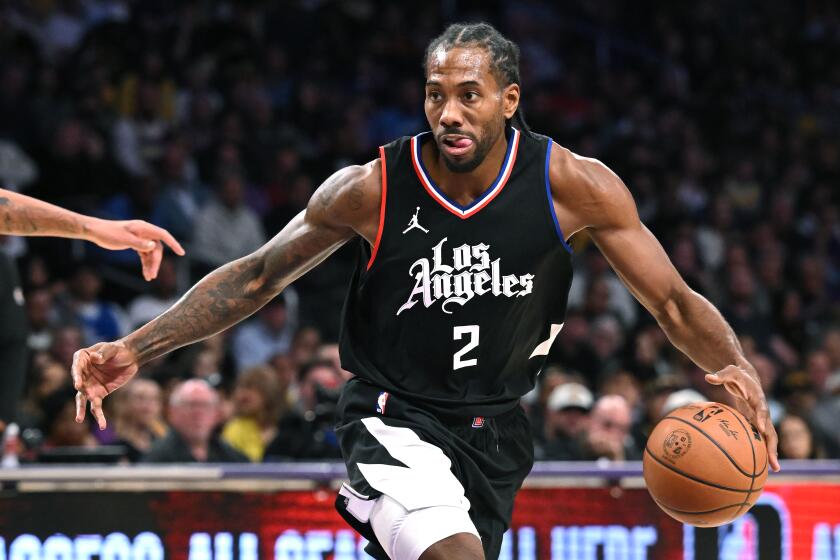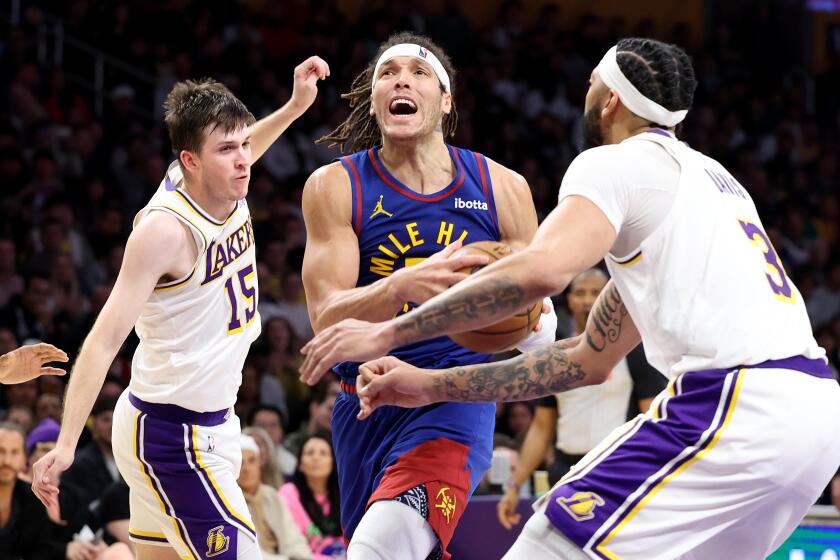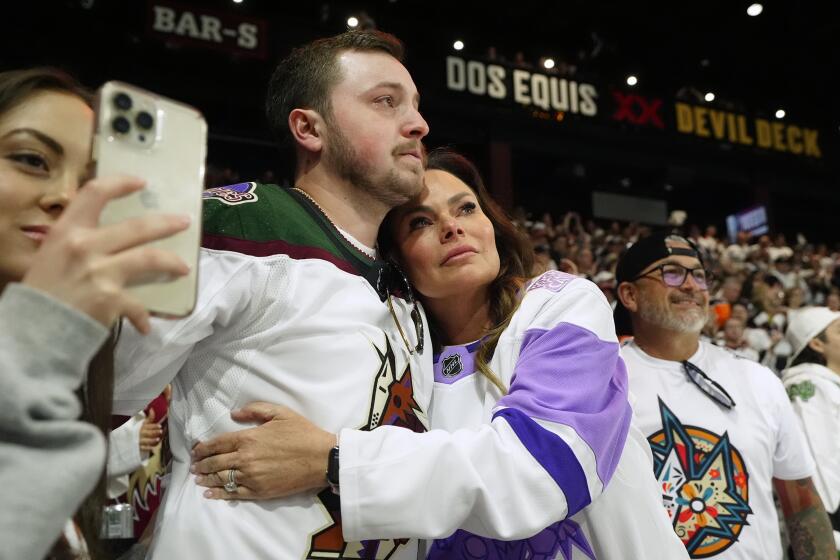Raiders’ revival starts with quarterback Derek Carr
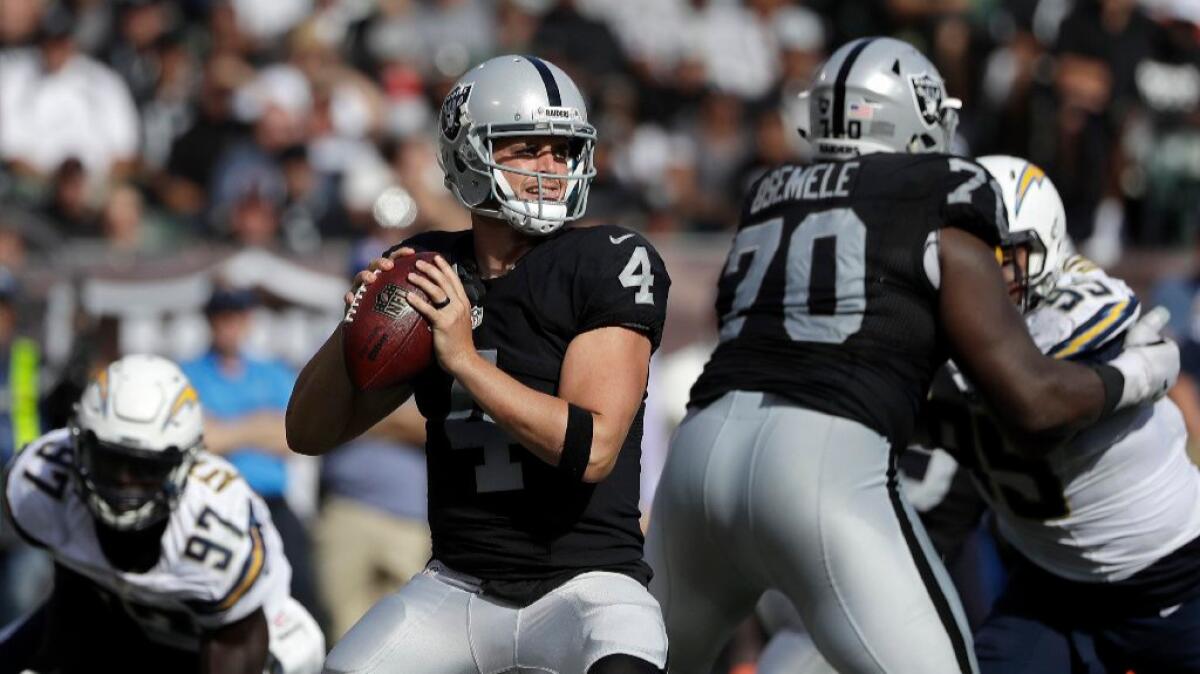
It’s no mystery to Rich Gannon why the 4-1 Oakland Raiders, even with their porous defense, are off to their best start since getting to the Super Bowl in 2002.
“It starts with the quarterback,” said Gannon, who played that position so ably for the Raiders, winning NFL MVP honors that same Super Bowl season. “Derek Carr’s time clock is extremely fast. He’s a lot quicker in the pocket, the way he processes information and gets the ball out. He reminds me a little bit of Aaron Rodgers when he’s in the gun with the way he gets the ball out.”
Without question, Carr is the best Raiders quarterback since Gannon, and he’s gone relatively unscathed this season, due in part to his quick release, exceptionally talented receivers Michael Crabtree and Amari Cooper, and an excellent offensive line. He has been sacked five times in five games.
The Raiders play host to Kansas City on Sunday, and Carr will look to build on the club’s best start in 14 years. Gannon, now a color analyst, will be in the booth for CBS.
Carr has 11 touchdowns with two interceptions and ranks third in the AFC with a 102.3 passer rating.
Oakland needs to score a lot of points, because its defense, despite some marquee players up front, is suspect. The Raiders are ranked last in total defense, surrendering 452.6 yards per game. They are 25th in average points allowed (27.4) but third in average points scored (28.4).
In retrospect, Carr was the steal of the 2014 draft class, when he was selected with the fourth pick of the second round. The quarterbacks taken before him were Blake Bortles (third by Jacksonville), Johnny Manziel (22nd by Cleveland), and Teddy Bridgewater (32nd by Minnesota).
Gannon, who keeps close tabs on the Raiders, said he first saw something special in the young quarterback during Carr’s rookie season, even though the team went 3-13. One game that season that stood out to Gannon was a 30-24 loss at Seattle, when the Raiders dropped to 0-8 but Carr showed his toughness.
“They were terrible, man,” Gannon recalled of those Raiders. “Their offensive line wasn’t very good, and they had no juice at receiver, no tight end, and they didn’t really have a running game. This kid stood in there and kept them competitive for a while and slung it around. He kept on getting hit in the face, and he didn’t even flinch. That was a real good indicator to me that this kid could be a special quarterback.”
Name game
Fitz has five touchdowns this season.
That’s a good thing in Arizona, where receiver Larry Fitzgerald is tied for the league in that department.
It’s not so good for the New York Jets, though, as quarterback Ryan Fitzpatrick has five touchdowns and 10 interceptions.
The Cardinals play host to the Jets on Monday night, and one of those 33-year-old Fitzes figures to walk off the field happy.
Fitzgerald, who has spent his entire career in Arizona, has scored a touchdown on every other NFL team except the Jets, Baltimore and Denver.
Fitzpatrick, a native of Gilbert, Ariz., has fallen off his pace of last season when he finished with 31 touchdowns and 15 interceptions.
If the Jets’ Fitz has a long night Monday, it could be because of Patrick. Through five games, the Cardinals’ Patrick Peterson has allowed the fewest receiving yards of any cornerback in the league. He’ll draw the assignment of shutting down New York receiver Brandon Marshall.
Sacks of cash
The New York Giants aren’t getting a lot of bang for their buck out of their high-priced defense these days. They are last in the league with four sacks after opening their wallet extra-wide this off-season.
The Giants, who finished 32nd in defense last season, paid top dollar for free-agent defensive end Olivier Vernon, cornerback Janoris Jenkins and defensive tackle Damon Harrison, but have yet to see a big return on their investment. The unit is ranked 17th overall, but is third-worst when it comes to allowing opponents to convert third downs.
Vernon signed an $85-million deal with $52.5 guaranteed; Jenkins got a $62.5-million deal with $29 million guaranteed; and Harrison got $46.3 with $24 million guaranteed. What’s more, three of the Giants’ first four draft picks were defenders.
Defensive coordinator Steve Spagnuolo didn’t sound overly concerned about the sack numbers when asked about them this week. He said he doesn’t track them and takes notice only when someone on the outside mentions it.
“Sacks are great, they’re effective, they make a huge difference,” he told reporters, according to NJ.com. “It is not the telltale, in my opinion. It’s not one of the statistics that we use that has a great correlation between points allowed and points not scored. To us, we take the most important that correlate most to points allowed. Quarterback rating, 1st- and 2nd-down rushing stats … explosive plays. Sacks is not one of them. Would we like to have more? Yes.
“Would we like to have more pressure on the quarterback? Yes. I do think that there are moments in there where we are hitting and getting pressure on the quarterback that don’t show up on a stat sheet. But we need more.”
Book it
Dallas plays at Green Bay on Sunday in a matchup that will further clarify the pecking order in an NFC loaded with potential powerhouse teams. Cowboys-Packers is a storied rivalry that author Jeff Pearlman touches on in his just-released book “Gunslinger: The Remarkable, Improbable, Iconic Life of Brett Favre.”
Pearlman points to Green Bay’s 38-27 loss at Dallas in the 1995 as a turning point for the Favre-led Packers.
“Favre’s three touchdown passes were a mirage that failed to fully disguise the fact that he threw two interceptions, was sacked four times, and hurried nine other throws,” he writes. “Afterward, he rightly called the loss a ‘step ladder — each year we go up another rung. This was one more step.’”
On the flight home, a group of Packers players sat in the back of the plane and talked about what went wrong.
“Next year,” defensive end Reggie White said, “we’re winning the Super Bowl.”
Writes Pearlman: “Favre’s mood changed from despondent to hopeful. `Hell, yes,’ he said. `Hell, yes.’”
The Super Bowl score the following year: Green Bay 35, New England 21.
Follow Sam Farmer on Twitter @LATimesFarmer
More to Read
Get our high school sports newsletter
Prep Rally is devoted to the SoCal high school sports experience, bringing you scores, stories and a behind-the-scenes look at what makes prep sports so popular.
You may occasionally receive promotional content from the Los Angeles Times.
